BUNNT-CO
Citizens' initiatives for nature and environmental protection in Northwest Tunisia - Community Organising
A project within the framework of the Ta'ziz Partnership for Democracy funding programme of the Federal Foreign Office of Germany.
Project duration: 01.09.2023 - 31.12.2024
The aim is to promote civic participation in north-west Tunisia and to create discursive spaces for the future generation, thus creating the conditions for democratic transformation in civil society. The project objectives correspond to this
- Strengthening and expanding a civil society network of environmental protection associations and environmental initiatives as "advocates for nature and the environment" in the sense of civil society participation and networking in society
- Motivating, mobilising and involving citizens to participate in nature, environmental and climate protection initiatives in the governorates of Beja, Jendouba, El Kef and Siliana in north-western Tunisia
In order to achieve these goals, this project is set up in the spirit of "Community Organising (CO)".
Community organising is a concept and a process that aims to empower citizens to actively shape and change their own communities and social environment. It is about gathering and organising people's voices and needs in order to fight together for social and political change.
For this reason, the two project modules "Community Organising I" and "Community Organising II" are at the heart of the project. The aim is to develop and implement thematic dialogue forums and citizens' forums.
Dialogue forums are events at which different interest groups or stakeholders discuss political or social issues and seek solutions on how they can tackle the issues together. The forums serve to promote understanding, communication and cooperation between different actors and can be organised by governments, NGOs or citizens' initiatives. Dialogue forums can be face-to-face events at a round table or in an action or joint project, online platforms or hybrid formats. They help to resolve conflicts and better understand mutual interests and perspectives.
Citizens' forums are forms of organisation set up by citizens to promote political participation and involvement in political decision-making processes. They provide a platform for discussion and opinion-forming and often work closely with political decision-makers and other organisations to represent citizens' political demands and concerns. Citizens' forums must/should be organised democratically and place value on transparency, participation and cooperation.
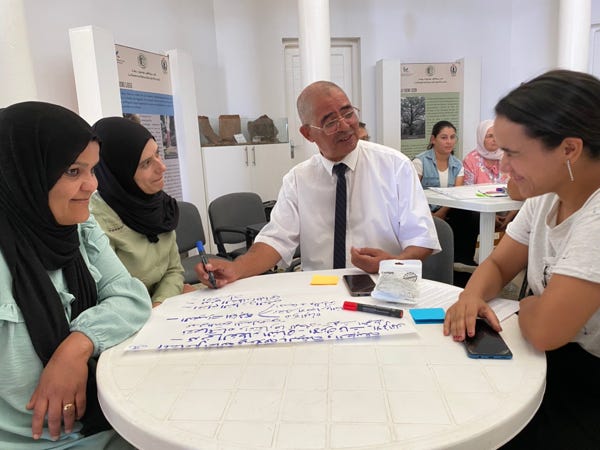
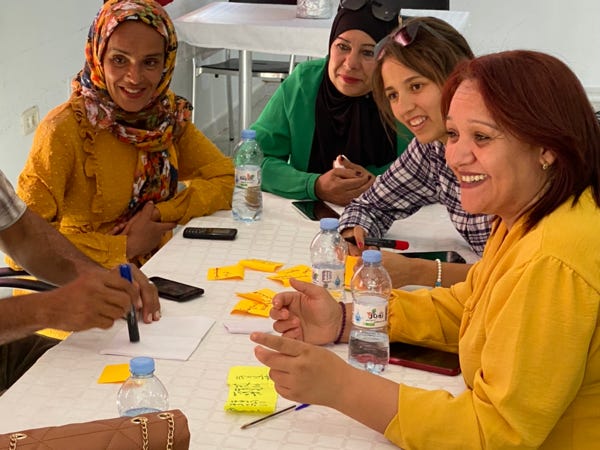
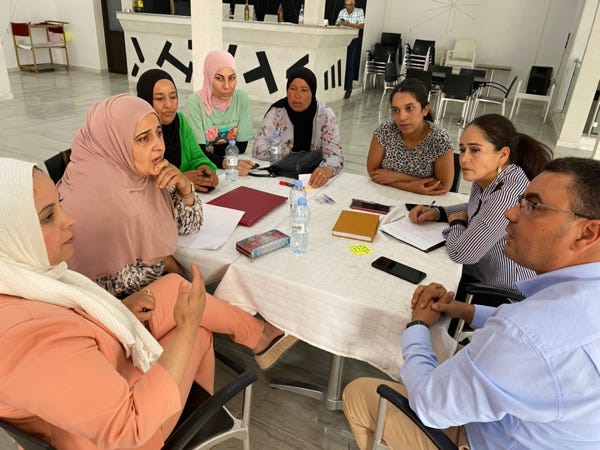
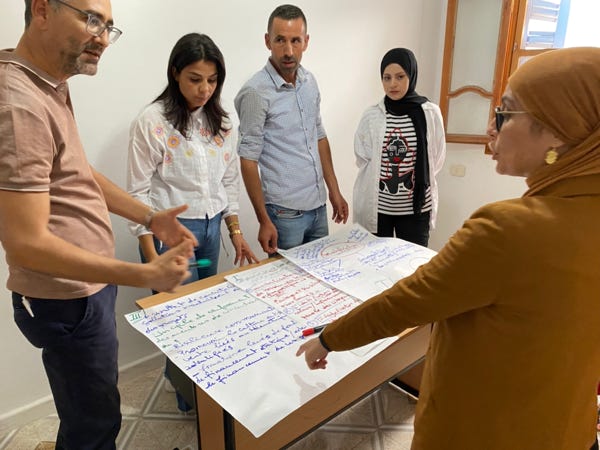
Impressions of work
in the project modules
Both forms of event and action can be organised at a regional level (in the individual governorates) as well as supra-regionally (in the four governorates of north-west Tunisia and beyond). However, dialogue forums will primarily play a role at the regional level and citizens' forums at the supra-regional level. However, the collective term "dialogue forums" will be used to refer to both forms of action.
One particular form of dialogue forum is the initiation of working groups to set up nature experience gardens in all four governorates, primarily to increase the environmental awareness of children and young people by
- Provide a natural environment where children can experience nature directly
- Teach environmental and nature education content in the form of activities, games and projects
- Provide the opportunity to develop practical skills in dealing with nature and resources
In order to qualify and empower the Tunisian project partners for these tasks, specific project modules were planned and implemented. These are the modules "stocktaking", "multiplier qualification in community organising", "strategy conference for project set-up", "method training I and II on community organising" and modules for "interim evaluation" and "final evaluation". All project modules are related to each other in such a way that they represent practical "milestones" for the progress of the project
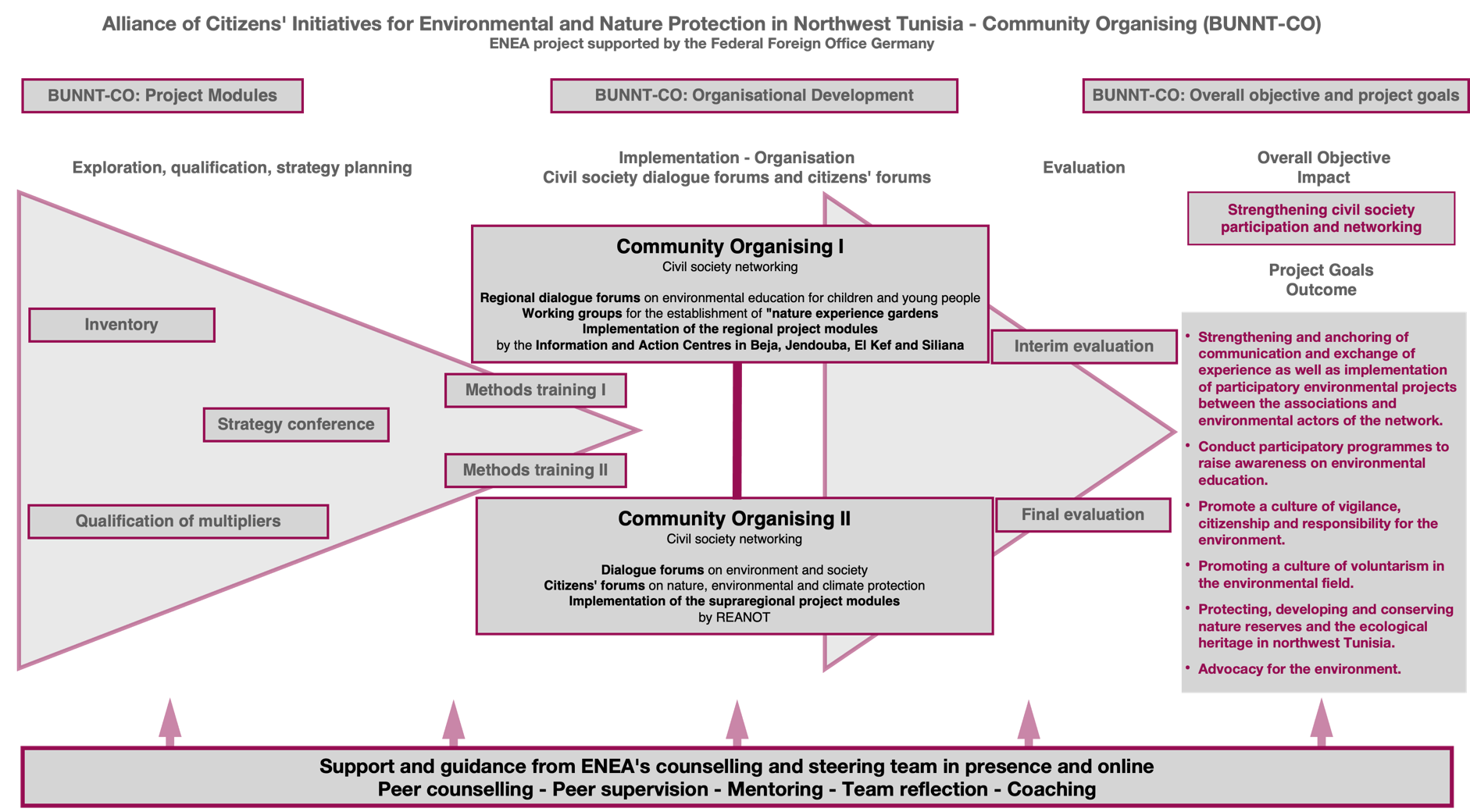
Voluntary services ...
ENEA contributes above all with the voluntary deployment of a steering and advisory team for monitoring, support, co-training, empowerment and collegial counselling, peer supervision, team reflection and coaching of the Tunisian partners, both in the face-to-face phases and in virtual meetings.
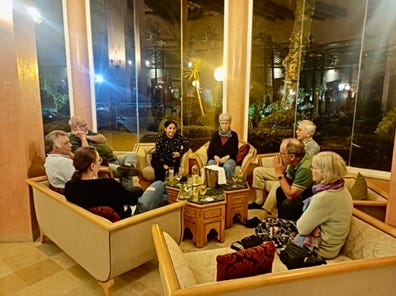
The project design is shown in the graphic below
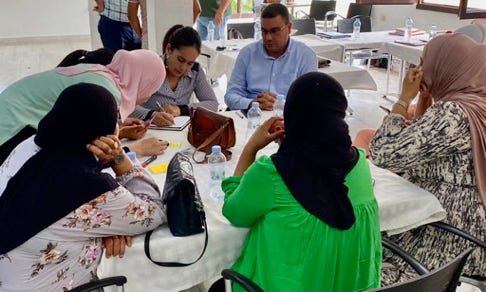
Project module 1: "Inventory"
The first task was to revitalise and sustainably develop the existing structures from the predecessor project "BUNNT" - the network "Réseau des Associations Environnementales dans le Nord-Ouest de la Tunisie" (RAENOT), which was established at the time. To achieve this, the organisation's ability to work had to be established in terms of personnel and secured financially in the long term.
The networking of the target group of environmental protection initiatives in four governorates in northwest Tunisia must be enabled to work productively with social stakeholders by providing qualifications and skills, especially for multipliers, pioneers and all "driving forces" with the help of the democracy-promoting problem-solving and moderation concept "Community Organising".
In October 2023, all four governorates were visited and a total of almost 100 regional stakeholders were sensitised and mobilised in one workshop each.
Of the "100" (99) participants according to the attendance lists, 58 were women (58%) and 41 men (42%). There were 29 associations from the fields of nature, environmental and climate protection, 9 GDAs (agricultural groups) and 12 administrative areas (forestry, agriculture, environment, schools)
The completed feedback forms show that 90% of participants were sensitised and affirmed that they had achieved a significant learning effect. Learning needs were also indicated with regard to communication techniques, planning techniques and organisational knowledge and procedures.
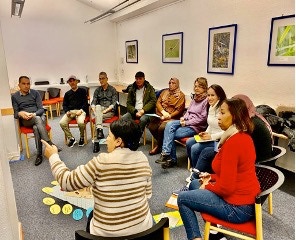
Project module 2: "Multiplier qualification“
9 partners from Tunisia - 5 women and 4 men - took part in the training programme held in Hanover in November/December 2023.
All participants (100%) want to become active and are fully (100%) committed to the objectives and content of the CO.
All participants are actively involved as multipliers in the recruitment of new stakeholders and in the planning and implementation of measures ("micro-projects as dialogue forums").
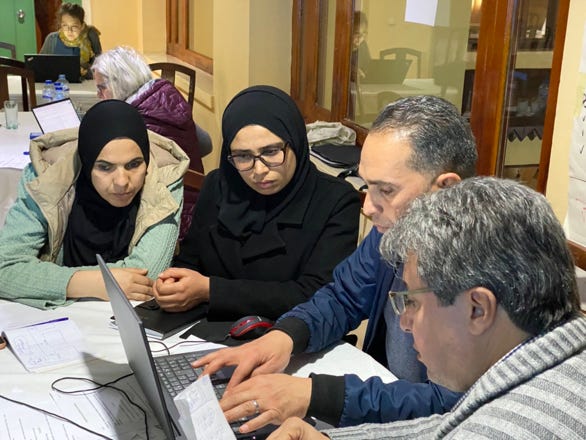
Project module 3: "Strategy conference"
In preparation for the strategy conference, which was held in January 2024, the Tunisian partners held a competition at the end of 2023 to receive proposals for citizen-based dialogue forums. Corresponding proposal forms were distributed to the nature and environmental associations associated with the network, to local and regional administrative bodies and to citizens at local markets. As a result, 78 proposals for "micro-projects" (dialogue forums) were submitted. The age of those submitting proposals ranged from 8 years to 92 years.
As part of the strategy conference, decisions were made on the common goals and concrete work plans - a joint "charter" was adopted as a guiding principle for the upcoming network work. A decision was made on the measures to be implemented to set up dialogue and citizens' forums and working groups, as well as on the use of financial project funds.
Of the 78 ideas proposed, 40 were prioritised and selected, i.e. 10 in each of the governorates. These will be successively implemented by the associations of the RAENOT network in cooperation with stakeholders and citizens from civil society.
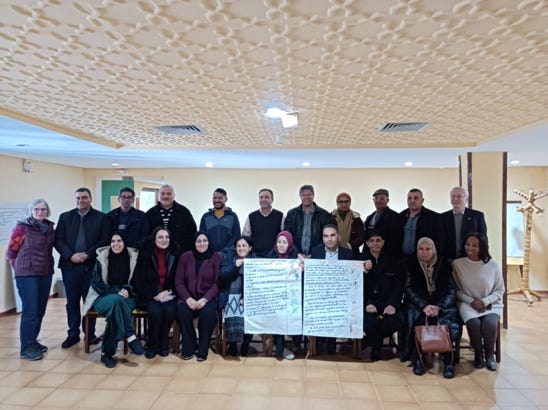
The project set-up was finalised at the strategy conference in January 2024 with the appointment of project steering committees. Project steering committees exist at the level of the four governorates of Beja, Jendouba, El Kef and Siliana as well as at the supra-regional level of "Northwest Tunisia", where the governorates are united.
These steering committees decide on the dialogue and citizens' forums to be held at the respective governorate level and at the Northwest Tunisia level.
The strategy conference was attended by 19 people (at least four per governorate), 10 of whom were women and 9 men.
Seven environmental and nature conservation organisations, two GDAs (agricultural groups) and eight administrative bodies from the forestry and environmental sectors and from schools were represented.
Regional project steering committees in all four governorates were initially made up of 4 people each (more can be added) and the supra-regional project steering committee of 9 people.
From 78 proposed project measures as a result of a "competition" among civil society, 40 were selected for implementation (prioritisation)
Measures were planned on the basis of the criteria.
- Costs
- Feasibility
- Social acceptance
- Impact on the environment
- Labour capacities
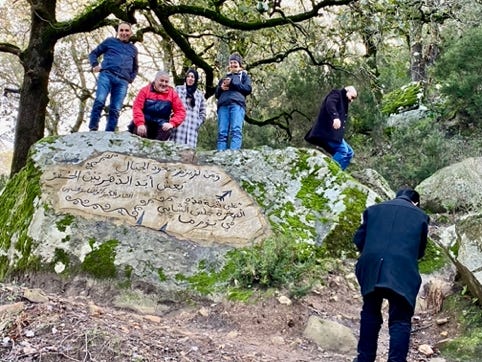
Project module 4: "Method training I for CO"
In order to prepare the designated multipliers and team leaders for the tasks relating to the "Community Organising I" project module, an initial methods training session was held in February 2024.
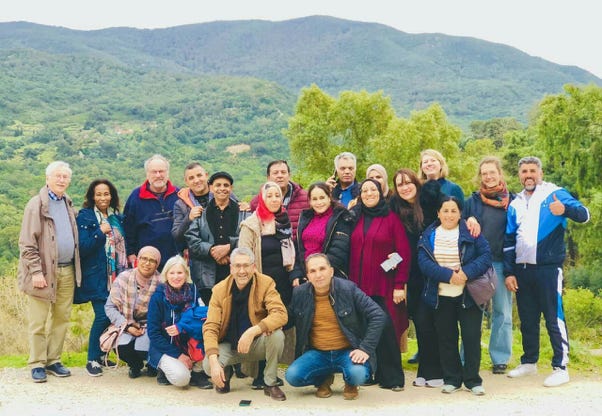
22 people (at least four per governorate) took part in Methods Training I, including 12 women and 10 men. Eight environmental and nature conservation associations, three GDAs (agricultural groups) and eight administrative bodies from the forestry and environmental sectors and schools were represented.
All participants (100%) want to actively participate in the project and 100% confirm the intended learning effect.
Project module 5: "Interim evaluation" - mid-term review -
At the end of April 2024, the interim evaluation of the BUNNT-CO project took place in the governorate of Kef, one of the four governorates in north-west Tunisia that are being supported by the project. Two "micro-projects" (dialogue forums) were visited and discussed.
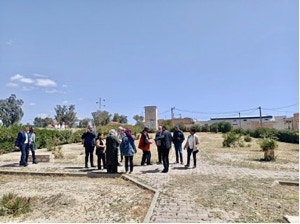
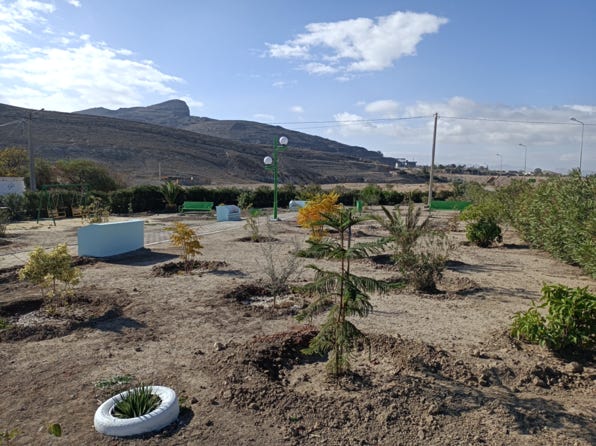
"Nature experience garden"
The municipality of J'rissa in the governorate of Kef is an example of how stakeholders from the administration, environmental initiatives, mining and civil society are coming together as part of the project and working together on a development strategy for the region. Among other things, BUNNT-CO focuses on raising awareness of nature and environmental protection - which is why a "nature experience garden" is being created in each governorate as a lighthouse project.
In J'rissa, the site selected for this garden is located in the middle of the landscape affected by mining and desertification in the Cité Essaada settlement. The public garden with a focus on environmental education is intended to strengthen local biodiversity and the presence of native plants. And this in a village that is adjacent to an old iron ore mine and in the immediate vicinity of a large cement factory. The garden is intended to ensure renaturalisation, offer local residents a place to experience nature and raise awareness of current environmental problems.
A "boulevard of biodiversity" will lead from the mining town of J'rissa with various tree species to the garden in Cité Essaada. Trees and plants for this and for the nature experience garden itself will be grown in a tree nursery run by the El Kef forestry department.
The irrigation of these plants will be ensured through co-operation with the mining company, which will provide the nearby and unpolluted mine water. The garden will also be equipped with benches, rubbish bins, a children's playground and lighting, some of which will be provided by the local authority.
During the visit to the garden site as part of the interim evaluation, a number of local residents were also present and expressed their willingness to contribute to the design and protection of the area. They also pointed out once again that they as a population have long suffered from the disfigurement of the landscape by industry and the lack of recreational opportunities in nature due to a strong change in the bioclimate towards noticeably greater aridity against the background of climate change.
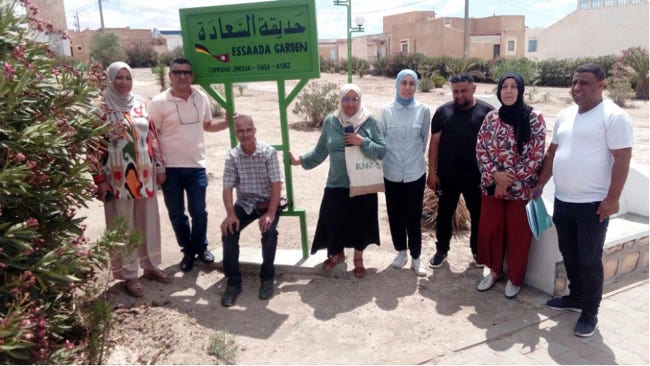
This example of J'rissa's "Nature Experience Garden" micro-project thus shows how the BUNNT-CO project is not only creating a small natural oasis for the local population, but also initiating a network of stakeholders who are taking the improvement of the surrounding conditions geared towards nature, environmental and climate protection into their own hands -
this is "community organising" in the best sense of the word.
"Raising awareness of nature reserves"
As part of the interim evaluation at the end of April, an existing nature reserve in the governorate of Kef was also visited. As part of BUNNT-CO, an information and awareness-raising campaign was launched in the "Saddine" nature reserve for visitors to the protected natural area. As part of this campaign, five new information boards were installed in the entrance area, which draw attention to the need to treat nature with respect in both Arabic and English.
During the project team's visit to the "Saddine" nature reserve, the project partners planted native Aleppo pines, which are endangered by the drought caused by climate change, but still have great locational advantages.
The newly planted trees serve as a symbol of the German-Tunisian partnership and the jointly growing future through the BUNNT-CO project. With the help of funding from the Federal Foreign Office, important networking work is thus being supported in north-west Tunisia with regard to the various players in nature and environmental protection.
After visiting the ecomuseum, the enclosure and the visitor centre, an exchange meeting was held on site, during which an open debate was held on many topics relating to the management and establishment of protected areas, forest management in general, current legislation, the usefulness of participatory approaches, the need for reconciliation with the local population, etc.
Prospects for a supra-regional dialogue forum
The reserve is an internationally recognised protected area under the Ramsar Convention, which has an informative visitor centre and is home to a wide variety of flora and fauna. Nevertheless, the number of visitors is rather low - a problem also experienced by numerous other protected areas of this type in Tunisia. Public awareness and knowledge of the nature reserves are rather low among the population. As part of BUNNT-CO, an increased exchange between the nature reserves is therefore to be initiated in the further course of the project in order to be able to act together strategically for sustainable ecotourism. Thematic dialogue forums should pave the way for successful environmental communication and bring together important stakeholders.
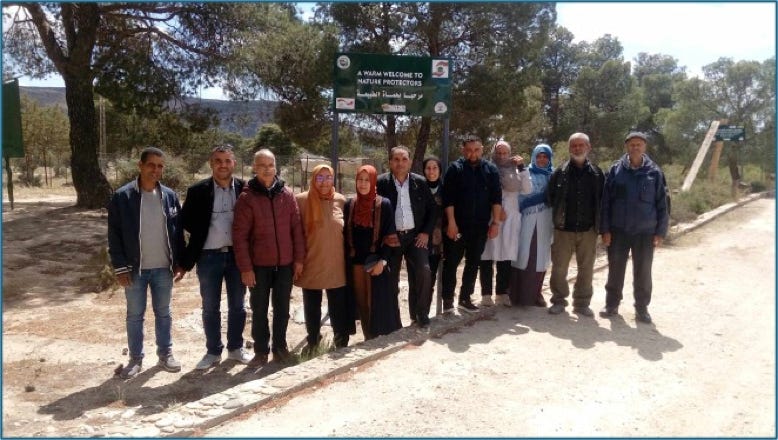
In all project modules, the appropriate methods and strategies were not only developed theoretically and practically and translated into solutions for community organising in the individual governorates, but holistic methods were also explored to communicate the concerns of the RAENOT network, as the example opposite shows
One of the outputs of the visit to the "Saddine" nature reserve was the proposal to start with a conference to which those responsible and other stakeholders from all protected areas in the four governorates would be invited in order to address and focus on common problems. A supra-regional dialogue forum should then be set up, in which all stakeholders (public administrations and civil society working in the field of nature, environmental and climate protection) should participate in order to hold in-depth discussions on this topic.
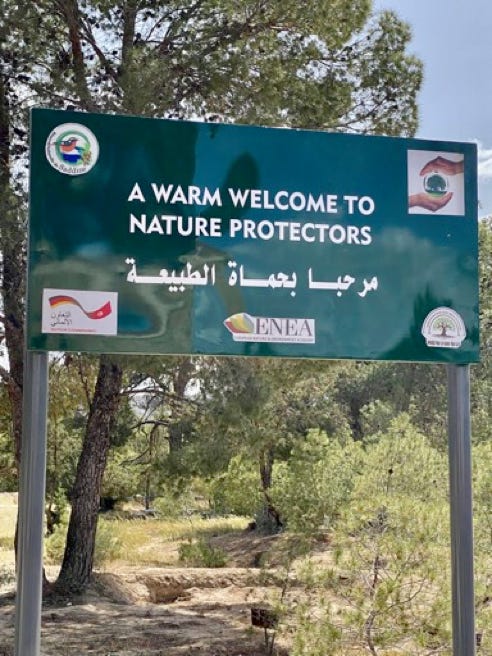
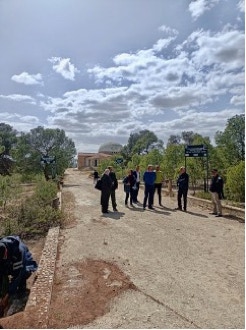
The aim should be to work together on strategic protected area management that provides an impetus for an "advocate for nature" function that the protected areas could assume vis-à-vis the public and political decision-makers.
After this "mid-term review", the project entered the "2nd half" with the next project module
Project module 6: "Method training II for CO
Mit diesem Trainingsmodul wurden die Teilnehmer/innen auf die geplanten überregionalen Dialog-Foren vorbereitet. Trainiert wurden Kommunikationsstrategien und -techniken, Stakeholderanalyse, Konfliktlösungsmanagement sowie Verhandlungstrategie nach dem Harvard Konzept in Theorie und Praxis mit Übungen und Rollenspielen.
24 people (at least four per governorate) took part in Methods Training II (end of May 2024), 13 of whom were women and 11 men. Seven environmental and nature conservation organisations, three GDAs (agricultural groups), two economic institutions (Centres d’Affaires) and seven administrative bodies from the forestry and environmental sectors and from schools were represented.
All participants (100%) want to actively participate in the project and 100% confirm the intended learning effect.
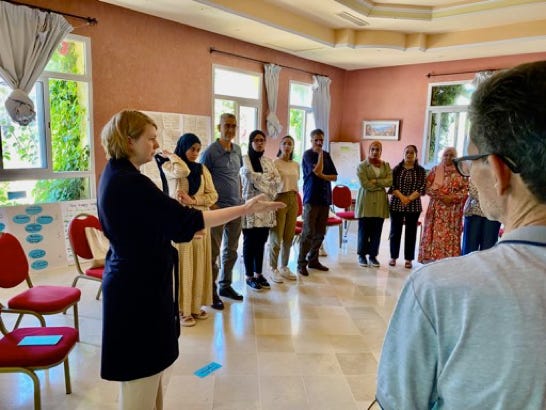
Community organising project modules (regional and supra-regional)
In the second half of the project term, the micro-projects (regional dialogue and action forums) planned as part of the ‘Community Organising I and II’ project modules were successively implemented, and the four supra-regional dialogue forums were developed and implemented. The results were presented and evaluated at the final conference in early December 2024.
Project module 7: Regional dialogue and action forums (micro-projects)
Regional project steering committees in each of the four governorates were responsible for coordinating and organising the dialogue forums. Once the 10 projects per governorate had been selected, the potential target groups and partners were involved in the planning. This resulted in different forms of projects and dialogue.
A total of 40 micro-projects were carried out with over 1000 active participants. In addition, many other visitors were reached, who were provided with information and sensitised. The active participants also included many young people, which meant that their parents could often be involved.
Some of the events focussed on the topic of ‘Avoiding plastic packaging by replacing it with biodegradable materials’. Some campaigns were dedicated to the topic of ‘waste avoidance’ with waste collection campaigns and the installation of waste bins around wooded areas and schools. In addition, there were a number of events to ‘raise awareness of nature and the environment’ on the occasion of the national ‘Trees’ and ‘Environment’ days, on International Biodiversity Day and as part of a major sporting event. Areas destroyed by forest fires were reforested as part of ‘planting campaigns’.
At some primary schools, ‘environmental clubs’ were set up with pupils and also for young people in several communities. Plays on nature and environmental protection were rehearsed and performed at two of these schools. Seminars on the ‘circular economy’ and the role of ‘nature conservation areas’ were held with students from the universities of Beja and Jendouba, and several visitor campaigns were organised with the installation of information boards in protected areas.
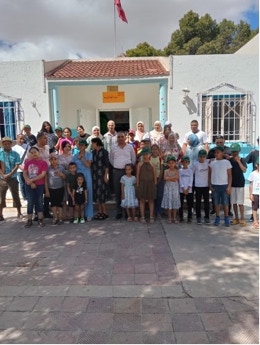
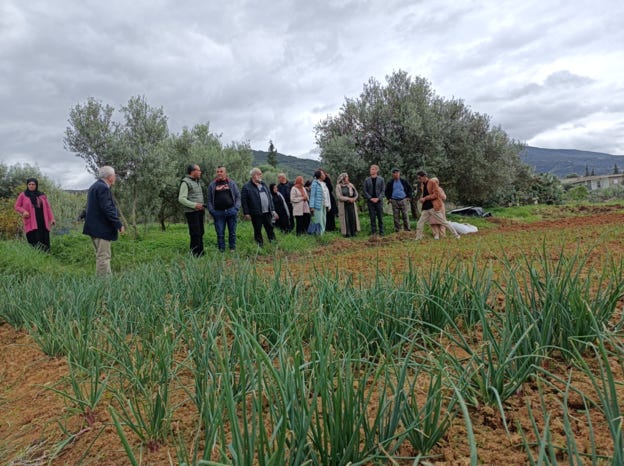
In Jendouba, the joint creation of an agroforestry garden for single women was initiated in June 2024. A local GDA (‘groupement de développement agricole’, agricultural development group) served as a partner for this exchange. Together with women who are the sole providers for their families, the topic of sustainable food security was put into practice: With the help of local residents, an area of the GDA was transformed as an example of sustainable agriculture and traditional land use with low water consumption and is now cultivated by the group's 30 women smallholders. This enables them to grow vegetables, fruit and cereals for their own needs and is seen and supported by the local population.
In July 2024, a theatre play on the topic of environmental protection was developed and performed at an educational institution in Kef. Together with the pupils, environmental issues in their everyday lives and the global context of worldwide climate change were first discussed. The children then devised a story that illustrates everyone's responsibility for nature on a small scale.
This was then staged as a theatre play, with a stage set, costumes and a large audience. More than 200 people attended the children's performance and were inspired by them to become more environmentally aware.
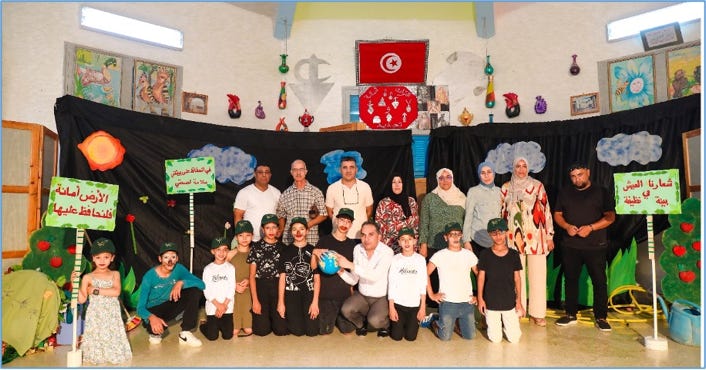
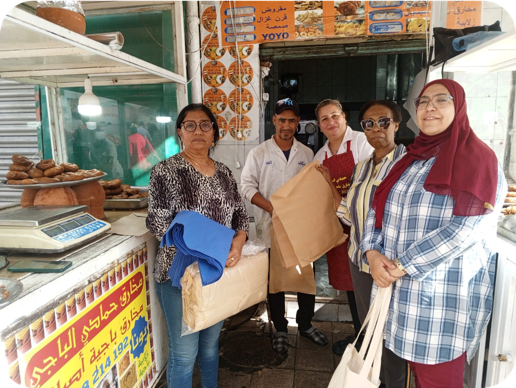
In October 2024, an awareness-raising campaign to prevent plastic bags took place at the main market in the city of Beja. A team of project activists from various associations used information materials and talks to raise awareness of the problem of plastic waste. This problem is very present in Tunisia, as there is still no great awareness of the need to avoid non-recyclable materials and, for the most part, there is no municipal solution for waste disposal.
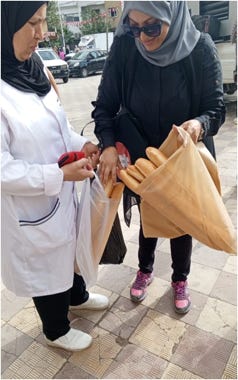
In addition to information, biodegradable bags were therefore also distributed on the market square. We worked together with a local company that manufactures these. As part of this project, one bakery has also switched to using biodegradable bags for sales on a permanent basis. All in all, such a high-profile exchange can appeal to many people from different sections of the population and encourage them to become active themselves.
In the last two months of the project, November and December 2024, three reforestation campaigns took place on forest fire areas in Siliana. In 2023, 1200 hectares of forest were destroyed by a large fire in north-west Siliana. The local population sees problems in the fact that the forest population is declining and the soil is becoming drier and less fertile. Together with local residents, especially young people from the village of Krib, the reforestation was planned with the forestry office. With the help of the local population, four hectares were replanted with young trees over three days of action. Participants in the campaign learnt about the regional impact of the climate crisis and discussed their own scope for action.
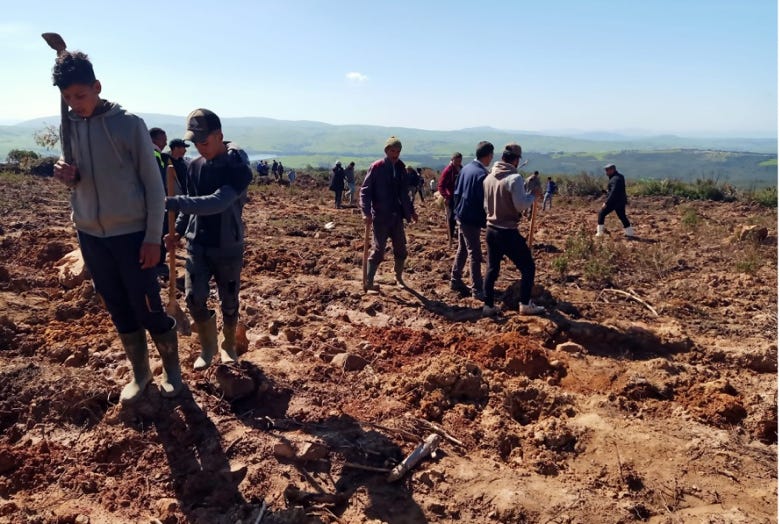
Project module 8: Supra-regional dialogue forums
Following the initial planning during Methodology Training II, the Tunisian project participants identified four topics as particularly relevant to their work in the environmental sector. Supra-regional dialogue forums on these four topics - ‘Protected areas’, ‘Water management’, ‘Desertification’ and ‘Waste/environmental pollution’ - were organised in late summer 2024. These forums serve to network various Tunisian stakeholders on the specific areas of work, promote dialogue between experts and civil society and develop concrete measures and solutions.
On 20 July 2024, the supra-regional dialogue forum on the topic of ‘Protected Areas’ took place in Tabarka with 44 participants. The aim of the forum, with participation from both the administrative side (e.g. the Director General of Forestry at the Ministry of Agriculture in Tunis) and the civil society side (associations and GDAs), was to formulate recommendations for action on the management of Tunisian protected areas. After an introduction to the problems and the legal framework through presentations by experts, key recommendations were developed in three groups. Following the forum, a group of selected delegated participants will draw up a policy paper summarising the 15 recommendations for action. A steering committee elected during the meeting will oversee the implementation of these recommendations, chaired by the Director General of Forestry. Furthermore, a national park is to be equipped with a sustainable management plan as a lighthouse project. The idea of establishing an action plan for participatory protected area management was also developed as part of the dialogue forum. The participants of the forum from various backgrounds and representatives of the RANET network declare their willingness to take responsibility for the application and implementation of the action plan.
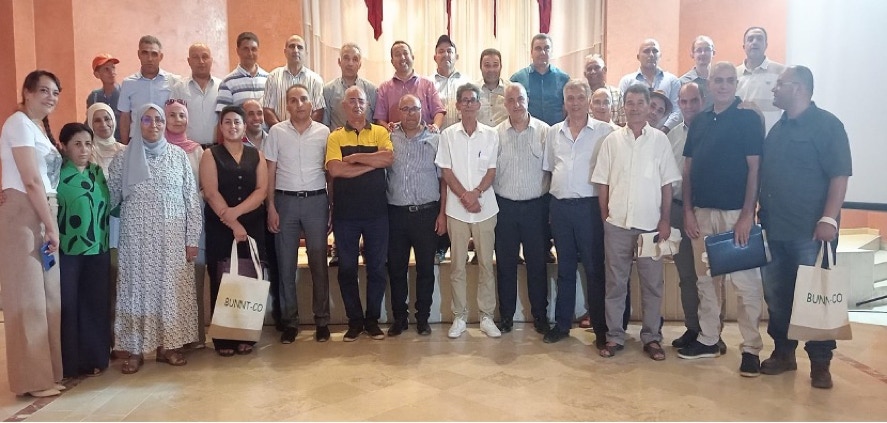
With a special focus on the topic of ‘dealing with water’ among women in the agricultural sector, the dialogue forum ‘Water Management’ on 19 September 2024 was a great success in terms of involving women from rural areas. The dialogue forum with 40 participants was followed by a visit to an exemplary cultivation area with over 80 women in total. The age of the participants ranged from 18 to 74 years and the aim of exchanging views on irrigation problems was more than achieved through the solutions developed. After a thematic introduction and categorisation in the ‘BUNNT-CO’ project, the participants also worked in small groups on the causes of water shortages and adaptation measures as proposed solutions. One important conclusion drawn by the women was the relevance of introducing agroforestry systems with indigenous plants. Such mixed crops can strengthen resilience in the face of climate change and secure the income of agricultural producers.
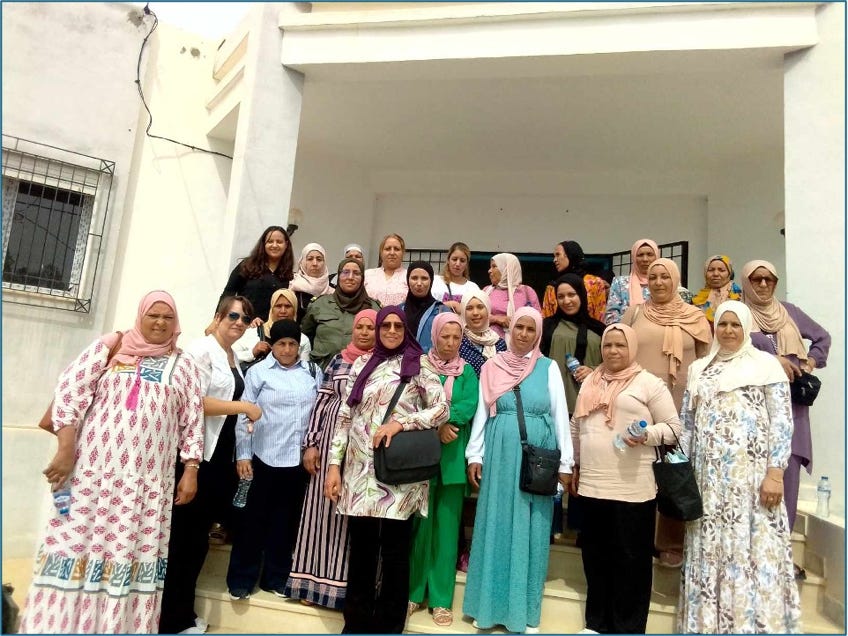
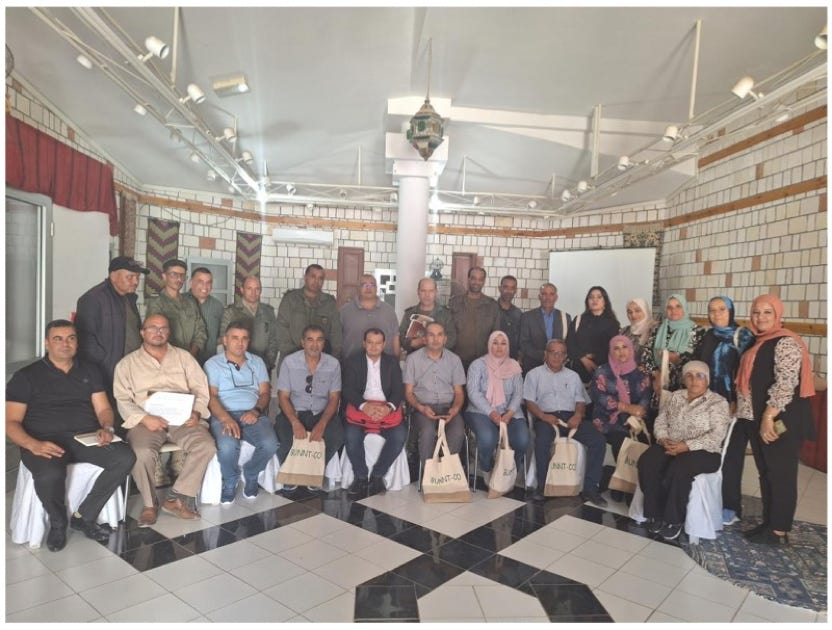
The dialogue forum on desertification took place on 26 September 2024 with 35 participants in Kasserine in the neighbouring governorate of Kef. The participants came from civil society, research, environmental and forestry administration, regional administrative posts and NGOs. The location of Kasserine in the south of the BUNNT-CO project area is particularly exposed to progressive desertification. For this reason, the forest engineer of the Kasserine governorate gave an overview of the problem situation at the beginning of the forum. Three groups then worked on the current environmental situation and solutions, on existing structures and their capacities and on the effects on society and possible courses of action. The forum was used to form various working groups on the measures developed.
The participants also discussed a particularly serious consequence of desertification: ‘children of sand’, a disease resulting from the silting up of the living environment. As a networking measure in the field of ‘desertification’, the forum has now taken an important first step towards promoting measures beyond the project area in Tunisia in view of climate change and anchoring the importance of the topic.
On 4 October 2024, the dialogue forum focused on waste and environmental pollution in northwest Tunisia and possible interventions. In addition to representatives from the municipalities and authorities, civil society actors and representatives from waste management (ANGED and ONAS) also took part.
This forum focussed on the pollution of the environment by various types of waste. Household waste, industrial waste, agricultural pollution and wastewater all pose major problems in everyday life in Tunisia.
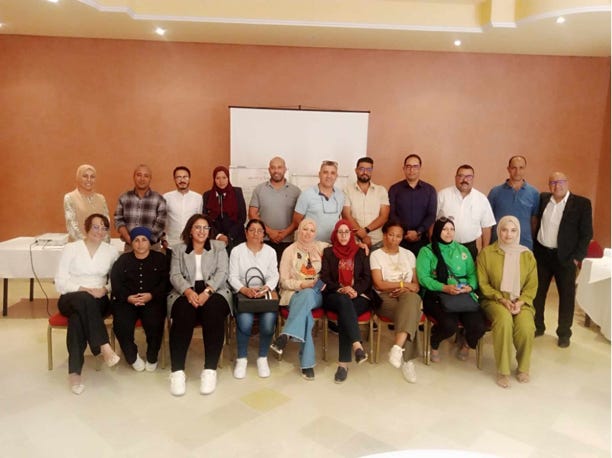
Four working groups were formed to develop ways of dealing with the different types of waste and propose solutions to reduce pollution. The idea of launching a pilot project in a local context (a neighbourhood of a city) also emerged during the dialogue forum. The participants want to target this pilot project as part of a continuation of BUNNT-CO.
In addition, a WhatsApp group was set up in the forum for communication between those active in the fight against pollution. This serves the continuous networking and exchange between those involved and the planned implementation of a pilot project.
Nature discovery gardens
In order to increase the visibility of nature conservation in public spaces, the BUNNT-CO project concept also included the installation of four nature experience gardens. From this basis in the concept, very different ideas for implementation and focussing came to fruition in practice. Each of the gardens has a different focus, and yet they have all become places of discovery and spending time for the local population. Especially with the Tunisian planting season starting in October and the national ‘tree festival /fetes des arbres’ on 10 November, the completion of the terrains took place towards the end of the year, at the end of the project.
Beja: School garden on sustainable agriculture and food security
In the governorate of Beja, the steering group has decided to create a nature experience garden on the grounds of a primary school. The inspiration for the construction of a botanical school garden in the village of Nefza came from a visit to the school biology centre in Hanover, where the Tunisian delegation was given a tour of the project site as part of the multiplier training. The garden was then planned and created in various stages according to the principles of community organising. Pupils, parents, teachers and workers were involved in the development. In particular, the school's environmental club and robotics club played a central role in the planning and realisation.
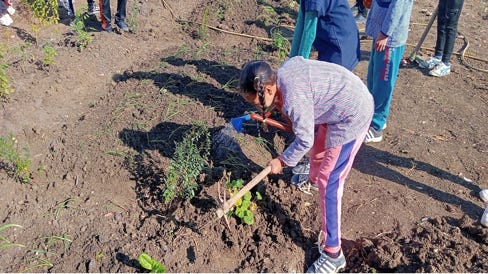
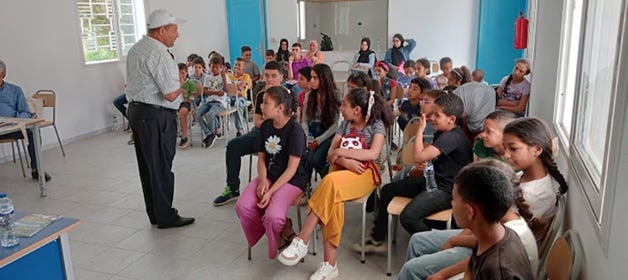
As part of the project, the school's robotics club suggested setting up an automatic irrigation system for the plants. Sensors were implanted in the soil so that irrigation takes place as soon as the plants need it.
In order to solve the problem of water wastage, an automatic irrigation network was set up on the initiative of the sensitised pupils, which is being monitored by a local association during the current school year.
The school's environmental club takes care of the plants themselves, also in collaboration with local associations. The garden is therefore a good example of cooperation between associations in the RAENOT network and civil society, in this case the future generation of engineers and environmentalists.
Jendouba: Community garden for learning about cultural traditions in agriculture
The nature adventure garden in the governorate of Jendouba is located in a remote area to the west of the village of Ghardimou, on the border with Algeria. The local population has no access to education, family centres or good connections to the nearest larger town. There is a school complex in the region with 357 pupils, in the immediate vicinity of which the adventure garden was created as a central meeting point. Teachers, pupils and local residents were all involved in the design of the garden. They are very committed to using, maintaining and developing the area together.
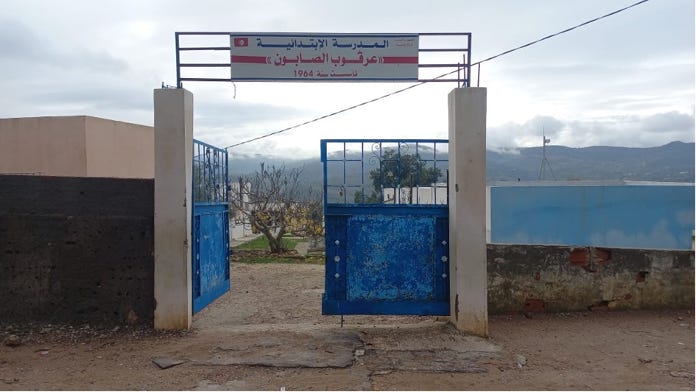
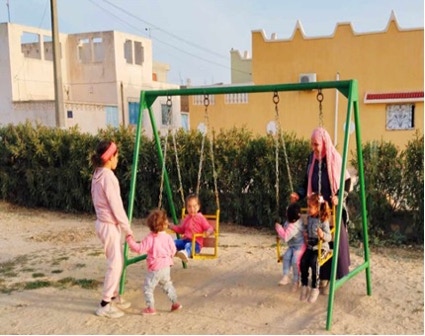
Kef: Leisure garden with environmental education for families
In J'rissa (Kef), a nature adventure garden was created as part of BUNNT-CO, which functions as a meeting place for families.
A green oasis was created in the town of J'rissa, which was affected by desertification and nature destroyed by mining, with the involvement of local residents.
They are also responsible for caring for and watering the plants. This garden is intended to offer families and children a beautiful natural place to come together and enjoy the environment in a barren landscape. Shade has also been planned for hot summers by planting tall trees. The importance of nature is emphasised to families with signs, but more through the sheer effect of the greenery
Siliana: Botanical garden to preserve biodiversity
In Siliana, a botanical garden was planned as a nature experience garden to draw attention to the current problems of climate change. This garden was designed as an open space for visitors to educate them about environmental problems and sensitise them to the need to preserve biodiversity. The large-scale project is being realised on an area of 17 hectares. Three criteria were taken into account when selecting the plants: Firstly, the native flora was considered in order to preserve the local biodiversity for future generations.
Then the group of medicinal plants was included, which can also be traditionally used effectively against diseases. Attention was also paid to the endangered plant species that are to be saved from extinction here.
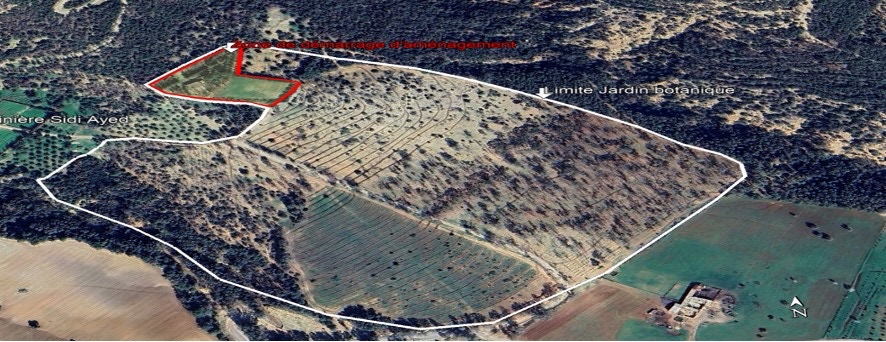
Cooperation with the local forestry administration, which also provides the land, ensures the sustainable management of the garden. In the course of time, a visitor and conference centre will also be created here, following the planting and labelling that has now been carried out. This is being initiated in collaboration with other organisations, which shows that a broad network has been spun around the use and maintenance of this botanical garden.
Project module 9: Final evaluation
At the time of the evaluation, the project group had once again grown closer together. Deep friendships have developed beyond the regions. And these are holding the network together stronger than ever. The Tunisian project participants always gave positive feedback on the course of the project during the evaluation. There was a great deal of gratitude and appreciation towards the ENEA association. Actually, the only point of criticism was the lack of time. But what the RAENOT network, what the people on the ground have achieved in the course of this 16-month project, is truly unique. And the connections, the network, will remain. It will change, it will grow, just as the environment changes. Most people left the last project meeting optimistic about the future. Many felt inspired, connected and hopeful, which they will take with them into the future.
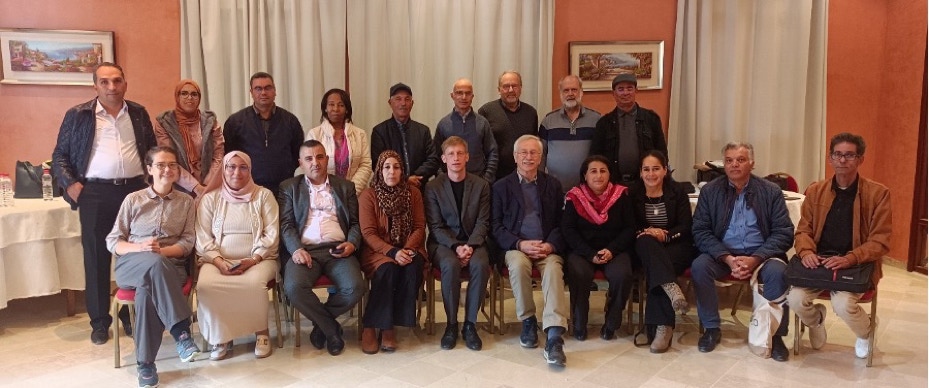
With the help of funding from the German Federal Foreign Office, it was possible to promote environmental protection in north-west Tunisia and support important networking work among the various stakeholders for the participatory shaping of the future. Through 44 dialogue events, important actors were networked with civil society, so that more than 11,000 people were reached through numerous meetings, campaigns and events within the BUNNT-CO project. Projects were even implemented in the two neighbouring governorates of Bizerte and Kasserine, in addition to Beja, Jendouba, Siliana and Kef. The four nature experience gardens were also created as visible project components in the four regions as places to come together and learn about nature and the environment. Above all, however, the diversification and expansion of the RAENOT network is an important project result. This network forms a civil society basis for future cooperation in environmental protection throughout Tunisia.
